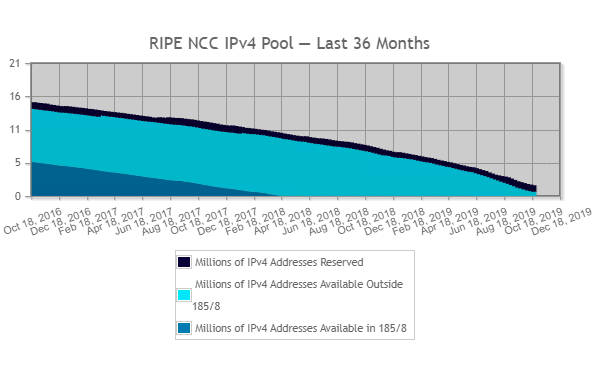| There Really Are No More IPv4 Addresses |
| Written by Harry Fairhead | |||
| Wednesday, 30 October 2019 | |||
|
RIPE, which manages IP address distribution for a large part of the world, has updated its address space chart showing how many addresses are left. It is clear that unless something unexpected happens RIPE will run out of addresses in November.
The IPv4 crisis has been going on so long now that it is tempting to say "crisis, what crisis!" There are about 4 billion IP addresses and now we are down to just 1 million. That sounds a lot, but users tend to want blocks of many addresses and 1 million for the foreseeable future isn't enough. There is already, from October 2nd, a limit to only /22 blocks (1024 addresses) being allocated and this will fall to /24 blocks (256 addresses) once the well dries up. At this point applicants will form an orderly queue and wait for IP address allocations to be returned to RIPE. Only applicants who have never received an IP allocation will be added to the queue. What effect will this have? In most cases end users don't apply for IP addresses directly - they get them from their ISP or from their cloud or server provider such as 192.168.1.1 and 192.168.0.1. . So for most users it isn't a matter of when RIPE runs out, more what happens when their ISP or server provider runs out. A recent survey by RIPE suggests that about a third ranked IPv4 run-out as a top three challenge and more than half said that they needed more IPv4 addresses in the next 2 to 3 years. Of course, like any resource run-out, estimates of doom and gloom are generally too pessimistic. Clever thinking makes the best of the situation. IPv4 has been hugely extended by the use of dynamic address allocation and Carrier Grade NAT. ISPs can now operate their service with fewer IP addresses. Companies which have stockpiled IPs are now able to make a profit on switching to NAT and selling their surplus IP addresses. It seems unlikely that November 2019 will go down in history as the day the IPv4 well ran dry, but things are going to get much more difficult. When you think that IPv4 has 4 billion addresses and only servers need a fixed IP, it doesn't seem reasonable that we have used them all up. Perhaps it is time to force companies to relinquish IP addresses that are needlessly allocated to servers that could just as easily be port-mapped. Can we do this automatically? Is it possible to scan IP addresses and make a list of uses that could be converted to NAT and port-mapping without a loss of functionality? We have spent a lot of effort getting everyone to upgrade to HTTPS, and this particular upgrade is arguably more important. We have been profligate with a resource that when first introduced seems so limitless that we could allocate huge blocks of addresses and let anyone use them as they wanted to without any penalty. Surely the answer is IPv6, which really is a limitless address space? Yes, but changing over seems harder than anyone ever imagined. More InformationRelated ArticlesIPv6 Is A Failure - Time To Move On IPv6 Day - The Internet Just Got Bigger Happy IPv6 - too little and so what! Fast Running Out Of IPv4 addresses To be informed about new articles on I Programmer, sign up for our weekly newsletter, subscribe to the RSS feed and follow us on Twitter, Facebook or Linkedin.
Comments
or email your comment to: comments@i-programmer.info |
|||
| Last Updated ( Sunday, 22 November 2020 ) |


